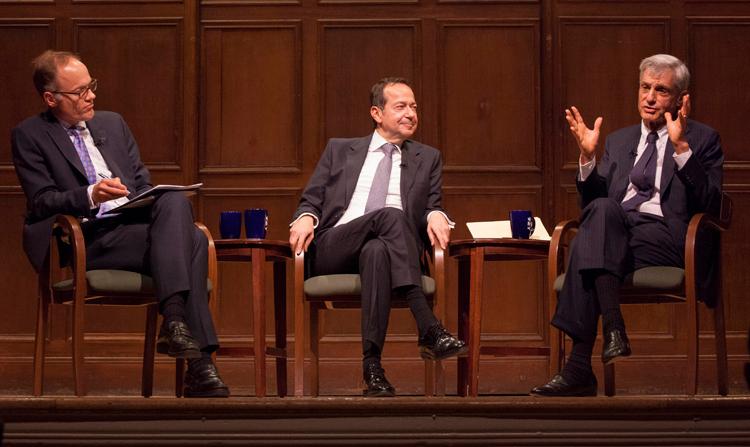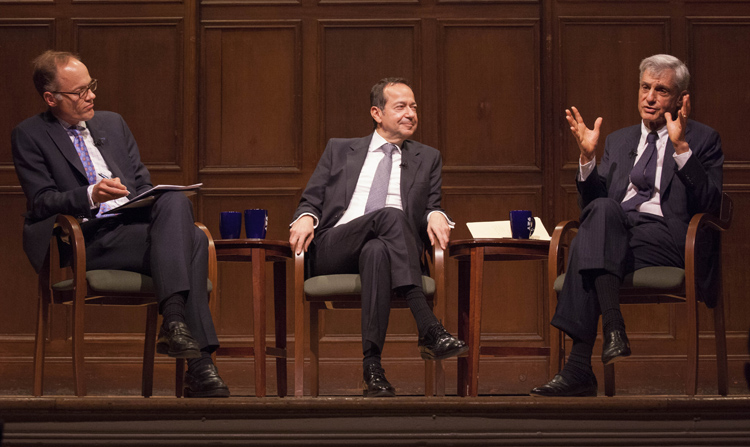NEW YORK—Famous hedge fund manager John Paulson and former Treasury Secretary Robert Rubin could not agree on a uniform outlook for the U.S. economy. Paulson and Rubin discussed their views at an event hosted by 92Y in New York City, Jan. 22.
“I think the U.S. economy is doing better,” said Paulson, who is particularly optimistic about the housing market. “It is well off the bottom and is showing a relatively strong recovery,” he said.
Paulson is the president and founder of Paulson & Co., a New York based hedge fund. Paulson is most famous for making $3.7 billion betting against the U.S. subprime mortgage market in 2008.
Rubin, a former Goldman Sachs senior partner and secretary of the Treasury for the Clinton administration has a more “troubled view.” “In my view at least, the recovery is going to remain slow,” he says, citing fiscal problems, sluggish business investment, and a consumer limited in spending power due to low job and wage growth.
Rubin Critical of Congress
Rubin was especially critical of the large fiscal deficit and thinks politicians lack the will to return the United States to fiscal prudence. “I think this was a tremendous opportunity for the system to come together to produce a comprehensive program,” he says about the fiscal cliff debate at the end of 2012 that resulted in an “inconsequential program.” “We avoid the disaster and do nothing positive to solve the problems,” is his conclusion.
In his function as a treasury secretary under President Clinton, he managed to return U.S. government finances to a surplus at the end of the 1990s, with the support of a booming economy. Right now, however, he admits to having “low faith in politicians.”
Paulson, who set the earnings record for hedge fund managers in 2010, grossing almost $5 billion, has more confidence in Washington. “People are afraid of the problems, but at the end of the day, they solve the problems. People were afraid of the debt ceiling, but now they passed legislation that extends it for three month. … Both sides of the aisle want to see job creation, they want to see more growth.”
Paulson’s very good track record was tainted in 2011, when he made several bad bets buying Bank of America, Citigroup, and Chinese company Sino Forest, which is now defunct after an accounting fraud scandal. His flagship fund Advantage Plus lost 52 percent that year, but recovered in 2012.
Worries About Currency Wars
Both Rubin and Paulson were concerned about the situation in Japan and warned that competitive currency devaluations could not be contained.
The Bank of Japan (BoJ) announced an open ended easing program Jan. 22, which includes the purchase of 13 trillion Yen ($145 billion) worth of government securities every month beginning in January 2014. The objective, according to the BoJ is to reach 2 percent annual inflation in consumer prices. Implicitly, the program is also designed to spur exports by weakening the yen.
“The problem is that the U.S. started printing. We got into a competitive situation where the other major currencies started to print massively,” according to Paulson who says that this lead to a higher yen and made Japanese exports more expensive.
“In order to maintain sales, [the Japanese corporations] had to cut prices. They were getting killed with the strong yen. At this point [the BoJ] didn’t have a choice,” says Paulson who thinks that Japan cannot be the only major country that doesn’t print money.
Robert Rubin thinks that these instances of competitive devaluations cannot be moderated by an international body, such as the G-7. “Every country will do what is in its best interest,” he says.
Paulson Bullish on Everything but Bonds
Talking about possible investments, Rubin and Paulson again had different opinions. “If you are a renter this is probably the best time in a lifetime to consider being the owner of a house. It’s cheaper after tax to own a house than rent,” says Paulson who thinks that cheap mortgage rates and tax incentives should also boost prices.
Paulson also likes stocks compared to bonds, where he thinks the yield is too low. “The beauty of stocks is that the earnings go up every year. … Stocks should go up. Given the discrepancy [with bond yields] there is a lot more potential for the stock market to rise, assuming that confidence is continuing to grow.”
“No matter how you look at the bond market, that price seems to be out of sync with reality. I think there are a lot of risks in our system,” says Rubin, who argues that tail risks such as inflation, “unprecedented” monetary policy actions and high fiscal deficits could lead to a crash in the bond market.
“You could have a substantial dislocation in the bond market and then you would likely have a distortion in the stock market as well. I think there is a complacency and an underweighting of risk that makes me very uneasy as an investor,” he says, hinting that Treasury bills could be the ultimate save haven investment. “It’s a very difficult environment in which to try to construct a portfolio. The timing of all of this is impossible to predict.”
While Rubin was successful in running public surpluses during this tenure as a treasury secretary, some analysts say he is responsible for creating the very tail risks that he is now afraid of.
He was a strong proponent of financial deregulation and pushed for the removal of the Glass-Steagall Act in 1999. The law, dating back to 1933, had separated investment banking from retail banking activity for decades.
“The deregulation of derivatives, or stopping the Commodities Futures Trading Commission from regulating derivatives … in the end weakened our financial system and exposed us to the risk of financial disaster,” Phil Angelides, co-chair of the Financial Crisis Inquiry Commission told Newsweek when asked about Rubin.
To protect a portfolio against the consequences of financial dislocations and massive money printing, John Paulson recommends adding some gold to the mix. “I believe if you print more dollars, ultimately those dollars will become worthless. … Right now the Fed is expanding the balance sheet very aggressively. As long as the Fed is buying [assets] that’s going to be positive for the gold price. In an inflationary environment, there are very few investments that are as attractive as gold. Over 3-5 years it’s a much more attractive investment than cash.”
The Epoch Times publishes in 35 countries and in 21 languages. Subscribe to our e-newsletter.







